When it comes to fertility treatment, many options are available for couples struggling with infertility. Ovulation induction and intrauterine insemination (IUI) are some of the most common treatments, but In Vitro Fertilization (IVF) is the best option for those who have tried everything else but failed to achieve pregnancy.
IVF treatment can help couples have their biological child. It involves controlled ovarian stimulation in the lab using the woman’s eggs and the man’s sperm.
Today, IVF is considered a successful infertility treatment when taken under the supervision of an experienced doctor.
But there is no doubt that IVF procedures can be very stressful for some couples. Though most couples look forward to this treatment because it is their last hope to have a baby, there are many side effects of IVF treatments that people are unaware of, which we will discuss in this article.
When it comes to IVF Treatment without any side effects, Aastha Fertility Care has a dedicated team of doctors, physicians, and a well-equipped lab that can provide the best treatments for patients. Our doctors have undergone regular training in advanced IVF techniques, minimization of side effects, and genetic diseases.
IVF treatment is a process that has been around for more than three decades now.
What is IVF, and How Does it Work?
IVF is a multi-step medical procedure that enables fertilization outside the body. Here’s a step-by-step overview:
- Ovarian Suppression and Stimulation: Medications are given to encourage the ovaries to produce multiple eggs.
- Egg Retrieval: Eggs are collected from the ovaries under mild anesthesia.
- Fertilization in the Lab: Eggs and sperm are combined in a special culture dish to create embryos.
- Embryo Transfer: One or more embryos are placed inside the uterus in hopes of achieving a pregnancy.
IVF can involve your own or donor eggs and sperm, and each step can affect people differently.
What to Expect When You’re Having IVF Treatments?

1. Body Changes
Life Changing Experiences with Aastha Fertility - From Doubt to Success
Women sometimes gain weight throughout IVF treatments, and hormone injections impact weight and appetite. Based on how many eggs grow or if you have modest ovarian hyperstimulation, your stomach may feel bloated and your clothes tight.
If you experience weight gain during IVF treatments, it may be helpful to discuss this with your doctor. They can advise on managing these changes and ensure your treatment is still effective. It is important to communicate any concerns or changes in your body with your healthcare provider to receive the best possible care.
2. Increased Hunger
Some individuals may experience increased hunger. Some drugs may boost appetite, but it’s usually emotionally driven.
Maintaining a healthy and balanced diet is crucial to cope with increased hunger during IVF treatments. Regardless of the cravings experienced, it is essential to eat healthily to support the body during treatment and promote overall health.
3. Gastrointestinal Changes
Constipation and loose stools are frequent IVF complaints.
To address constipation and loose stools during IVF treatments, increase water intake and consume fibre-rich foods for better digestive health.
4. A journey full of surprises
IVF procedures vary from patient to patient. Don’t be astonished if your appetite increases throughout treatment; do not be shocked if you require more sleep each night.
IVF treatments can have varied effects on different patients and can be unpredictable. Patients may experience changes such as increased appetite or the need for more sleep. It is important to know that these experiences are normal and a part of the process.
Common Side Effects of IVF Treatment
| Stage of IVF | Typical Side Effects |
| Ovarian Suppression | Mild bloating, breast tenderness, mood changes, spotting |
| Ovarian Stimulation | Headaches, injection site soreness, mood swings, nausea, bloating |
| Egg Retrieval | Fatigue, cramping, spot bleeding, mild pain, nausea, bloating |
| Embryo Transfer | Mild cramping, bloating, constipation, fatigue, injection-site bruising |
Stage 1: Suppression (Pause and Prepare)
The ovarian supression phase involves calming the ovaries using Oral contraceptives. Regular menstrual cycles have follicles mature at varying rates. And some are slower, and others are faster.
Their size coincides with their maturation; eventually, one dominant follicle will win out. Yet, this shouldn’t happen with IVF. The main aim is to mature all eggs at once to increase egg output during retrieval. Hence, OCs are used.
Side effects are minor if detectable. Examples:
- Breast pain
- Nausea
- Mood changes
- Spotting
Stage 2: Stimulation
The next phase involves injection since oral medication alone isn’t enough. In IVF, the more mature eggs you produce, the better. Injections are given for 8-14 days to stimulate egg production, and Slow-maturing follicles prolong the stimulation period.
There are some IVF injection side effects that some women may experience.
IVF injections side Effects include:
- Headaches
- Meltdowns
- Injection-site bruising
- Nausea
- Bloating
- Bruising
Stage 3: The Egg Retrieval
Egg retrieval (done under anesthesia) is the third stage where egg removal is done from the follicles.
Side effects include:
Egg retrieval involves surgery. Therefore, you’ll need anesthesia, which has effects, and most women have moderate side effects that disappear within a few days. These include:
- Spotting
- Soreness
- Fatigue
- Nausea
- Bloating
- Cramping
- Vomiting
Stage 4: The Embryo Transfer
Fresh or thawed blastocysts are transferred during an embryo transfer.
Apart from pregnancy, embryo transfer has some side effects.
Embryo Transfer Side Effects:
- Bruising
- Bloating
- Cramping
- Fatigue
- Constipation
- Injection-site bruising
Long-Term Side Effects of IVF Treatment
Some of the long-term side effects of IVF treatment are:
1. Ovarian Torsion
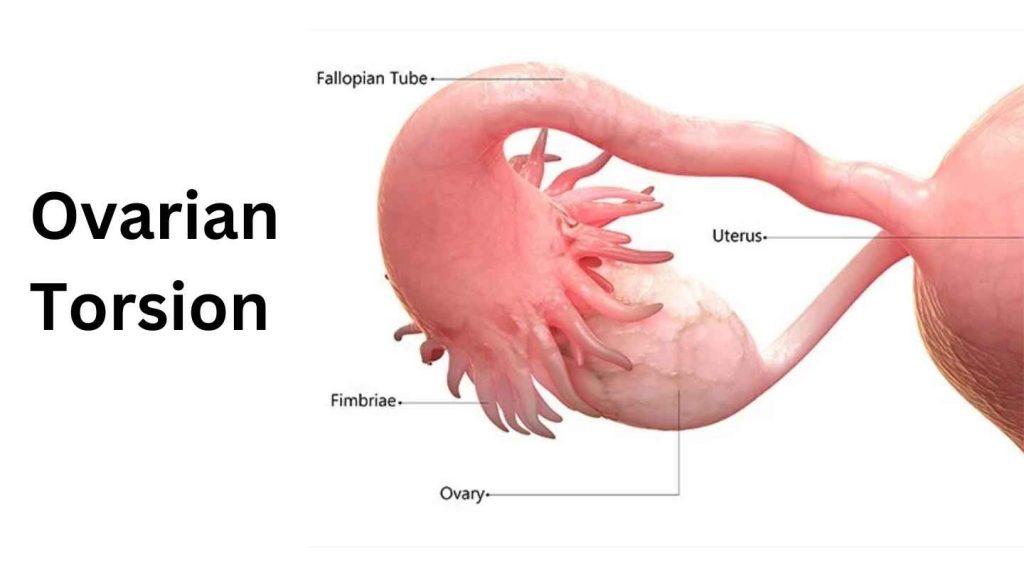
Ovarian is a condition when an ovary twists around the ligaments that hold it in place. It has been described as the most painful experience by women. Ovarian Torsion occurs when there is a problem with the ligaments that support the ovary and cut off the blood supply.
Various symptoms are associated with ovarian torsion, including sudden onset of severe pain, swelling in the abdomen, nausea, vomiting, fainting, or even convulsions.
2. Vision Problems
Although visual disturbances are relatively uncommon in IVF patients, they can occur after a cycle of clomiphene or gonadotropins stimulation. Visual disorders such as palinopsia (phosphenes) or afterimages can affect a patient’s vision. This problem occurs because of increased estrogen levels, linked to acute alterations in the visual system.
3. Ovarian Hyperstimulation Syndrome (OHSS)
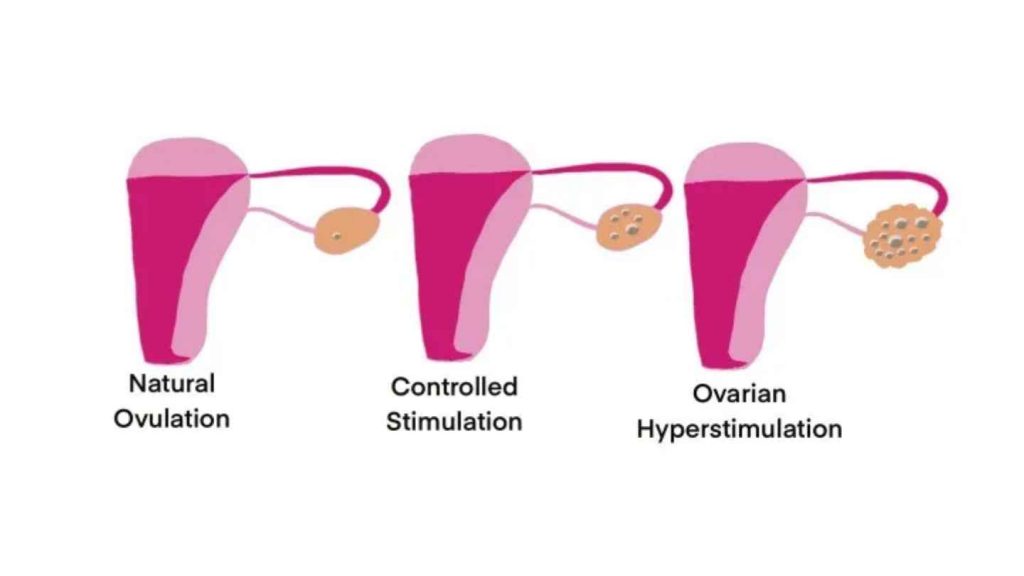
Ovarian hyperstimulation syndrome (OHSS) is a condition arising from the excessive release of the stimulating follicle hormone (FSH) in women undergoing In vitro fertilization (IVF). The syndrome refers to a set of symptoms that may occur soon after ovarian stimulation for an IVF cycle and it is one of the long-term side effects of IVF.
These symptoms can vary widely from mild to severe and result in pain and discomfort. OHSS is a potentially dangerous condition that could be fatal to the patient. Causes of OHSS include female body characteristics, medications, egg donation, and genetics.
4. Multiple Pregnancy
Another IVF treatment side effects long-term includes the increased risk that you might deliver more than one infant, known as twins or multiples.
In addition, IVF with multiple pregnancies is associated with fewer complications compared to providing a singleton. Preterm birth or premature delivery, low birth weight, and congenital anomalies are more common in identical twins than in singletons born by IVF.
5. Ectopic Pregnancy
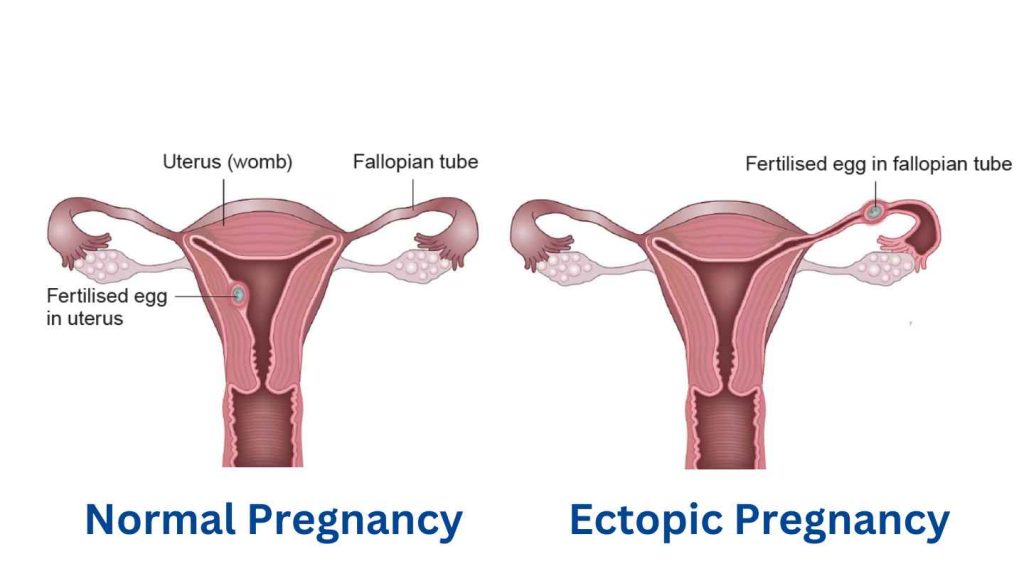
An ectopic pregnancy occurs when a fertilized egg implants outside the uterus, the most commonplace being in the fallopian tubes. Without proper treatment, an ectopic pregnancy can result in a tubal rupture and is life-threatening for the mother.
6. Cancer
Although there were reports earlier that certain drugs used for ovarian stimulation may cause ovarian tumors, more recent research does not support these findings. Women who have undergone IVF have no increased risk of breast, endometrial, cervical, or ovarian cancer.
Short Term Side-Effects of IVF Treatment
Some of the short-term IVF side effects of IVF are:
1. Anxiety
IVF can be emotionally and physically draining. Couples going through the process may find that learning about the process, support from counselors, lawyers, family, and friends will help them get through the ups and downs of infertility treatment.
Recurrent IVF failure is also a reason why some females are stressed about getting success in the next IVF cycle.
2. Mood Swings
Given that infertility is a sign of hormonal and reproductive imbalance, fertility medication’s most common side effects are headaches, nausea, mood swings, and bloating.
3. Premature Delivery
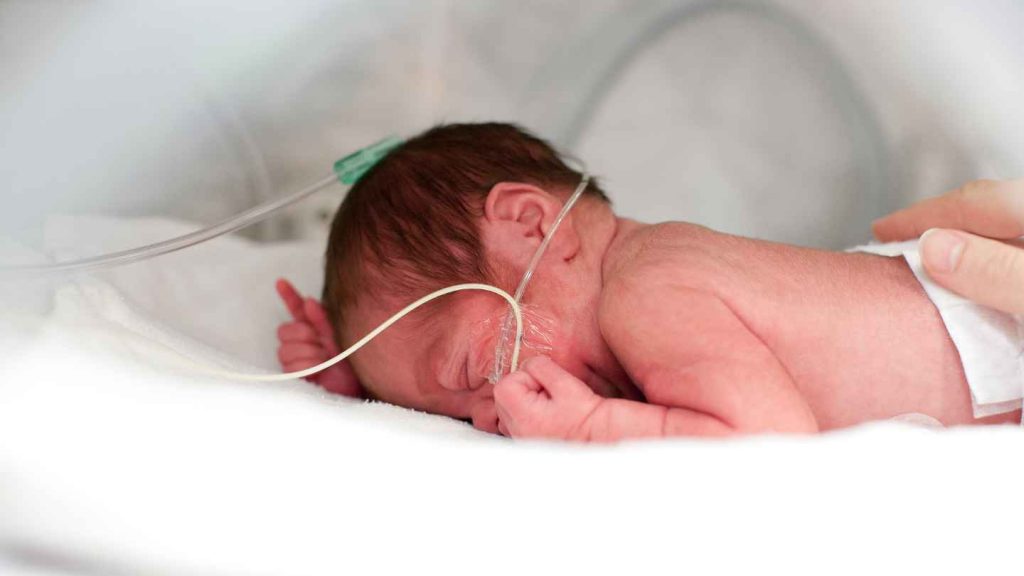
Research suggests that combining the sperm and egg in a laboratory dish and then transferring an embryo or embryos into the woman’s uterus slightly increases the baby’s risk of being born early or with low birth weight.
4. Allergic Reactions
Women planning to get pregnant in the near future have nothing to worry about. The chances of allergic reactions to fertility drugs are rare. However, as with any medication (or food), a reaction is possible. Suppose you have a family history of allergic reactions.
5. Grief and loss
The procedure of ART itself has been linked to increased worry, depression, and stress, which can affect your self-worth and self-esteem.
It may be especially true for you following a failed IVF cycle, making the IVF process challenging. It may result in stress in your personal life and finances, social isolation, fixation, and self-criticism.
It may impact your psychological and emotional health if you continue to struggle with these intense feelings over time.
Coping With Side Effects of IVF
Coping with the side effects of IVF might seem hard, especially the emotional part. Nevertheless, you have to try. You could do the following things to cope with the IVF side effects.
Seeking Support From Loved Ones And Professionals
It is helpful to speak with people who have been or are taking IVF treatments. Most importantly, it can let you know that you’re not alone and assist you in navigating the process’ emotional component. Talk to your partner and other people you care about.
Taking Care of Oneself Through Self-Care Practices
Permit yourself to take frequent pauses, and remember to spend time doing things you like. Treatments for infertility result in a whole new set of additional pressures.
The most vital thing to keep in mind is to treat yourself nicely. People frequently feel very alone and put a lot of strain on themselves. Avoid doing it! Engage in your favorite leisure activities to keep your thoughts calm and content. Your mood can be improved by engaging in activities that make you feel good.
Seeking Medical Attention When Necessary
If you experience any side effects after IVF treatment, you should seek medical attention to ensure everything is alright. If something is wrong, seeking medical attention could let the doctors take the necessary steps at the right time.
At this time, it might be crucial for some people to think about seeking medical attention for depression and anxiety. The doctor might prescribe some antidepressants and anxiety medications.
Seeking Counselling For IVF-Related Grief And Loss
The process of IVF can be emotionally challenging, and some individuals may experience feelings of sadness or loss.
- Counselling or therapy can offer a safe space to address these emotions and receive support from a mental health professional.
- Support groups and online communities can also provide a sense of connection with others who have gone through similar experiences.
- Seeking help can aid in managing the emotional toll of IVF treatment.
Managing The Financial Stress of IVF Treatment
IVF treatment can be expensive, causing financial stress for those undergoing it. To manage this stress, create a financial plan and explore options for financial assistance or insurance coverage.
Look for clinics that offer payment plans or discounts. Open communication with a partner or loved one can also help. Taking proactive steps can help reduce stress and make the process more manageable.
Balancing Work And IVF Treatment
Individuals undergoing IVF treatment may face difficulties in managing their work schedule alongside frequent appointments and time off.
Prioritizing self-care and establishing a routine that supports both work and treatment can also be helpful, such as scheduling appointments outside of work hours or taking breaks to manage stress and fatigue.
When to Seek Medical Help
Call your fertility clinic or seek urgent care if you notice:
- Severe abdominal pain or swelling
- Heavy vaginal bleeding
- Difficulty breathing or chest pain
- Signs of severe allergic reaction (rashes, swelling, trouble breathing)
- Persistent high fever
Prompt medical attention ensures complications are caught and managed early.
Aastha Fertility Care- The Right Choice For Treating Infertility
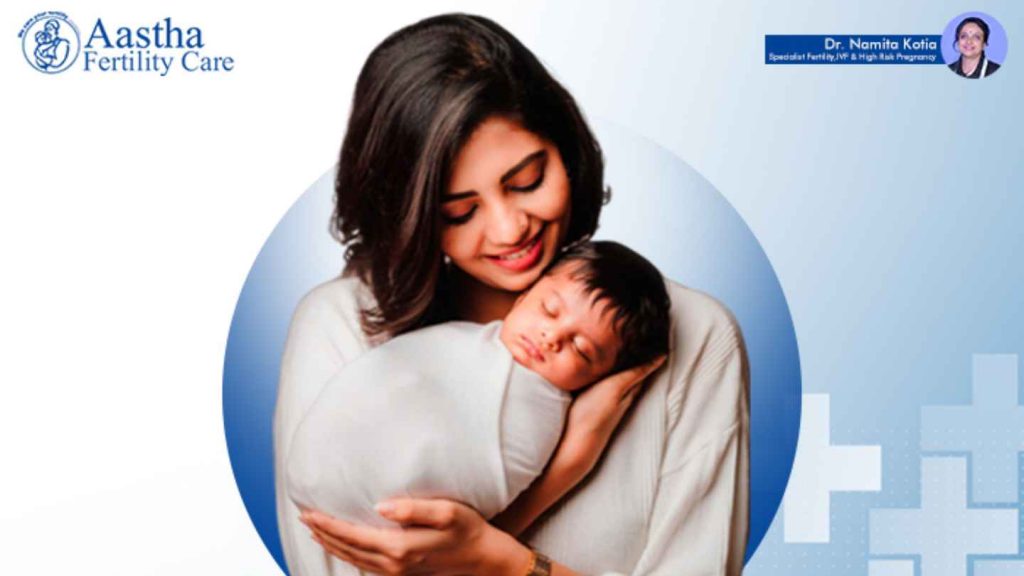
One of India’s leading fertility care clinics, Aastha Fertility Care, is the best option for IVF treatment. We ensure the highest IVF success rates and lowest miscarriage in all IVF treatments performed in advanced laboratories under IVF expert surveillance. The clinic is becoming a popular choice among patients from India and places like Australia, the Netherlands, and the Far East.
Aastha Fertility Care brings together the convenience of state-of-the-art technology with the warmth and compassion of a small clinic under one roof. The treatment combines advanced methods with time-tested practices to give you the best chance at conceiving a baby quickly and naturally without any side effects.
We make sure that every couple who comes to our clinic gets successful parenthood with happy smiles and no worries.
Conclusion
Seeking support from others during this time is crucial, be it your partner, therapist, family members, friends, or a support group who has gone or going through the same thing.
Having support and love makes your journey easier, increases the sense of positivity, and helps you navigate your emotional quotient. Self-care also plays a significant role.
After all, if you are healthy and happy, you can only expect your surroundings and baby to be happy and gain positivity from you. Pamper yourself because you deserve it.
Frequently Asked Questions
1. Can IVF cause any health issues?
Children born by Test Tube Baby are somehow a little more prone to health issues in the future. Female patients who have taken IVF are at risk of getting high blood pressure along with OHSS.
2. Does IVF damage your ovaries?
Yes, a female who has taken an IVF treatment can develop OHSS. Though the chance to get such a problem is rare, if it happens, it will damage your ovaries.
3. Can hot flashes be a side effect of IVF medication?
Yes, hot flashes could be an adverse effect of IVF medication.
4. Can IVF treatment lead to depression?
One of life’s most distressing psychological experiences is undergoing IVF treatment. It is expensive, frequently lonely, uncomfortable, and an emotional whirlwind. Many people starting treatment may experience depression due to their infertility issues.
5. What are the long-term side effects of IVF injections?
IVF side effects include OHSS (Ovarian Hyperstimulation Syndrome) and multiple pregnancies due to the use of IVF injections.
6. Is In Vitro Fertilization Linked to Increased Risk of Birth Defects?
In vitro fertilization increases the risk of musculoskeletal, eyes, reproductive organs, heart defects, nervous system deformities, premature births, and low birth weight. Maternal and paternal variables, as well as IVF, appear to pose risks.
7. Can IVF increase the risk of low birth weight?
Numerous studies have revealed that there is a higher risk of premature birth and low birth weight for women who become pregnant after receiving reproductive medication.
8. What Are the Side Effects of IVF Medications?
The side effects of IVF Medications include:
– Hot flashes
– Headaches
– Blurry Vision
– Nausea
– Headache
– Breast tenderness
– Bloating
– Chances of multiple births
– Cervical mucus changes.
9. What are the Side Effects and Risks of IVF Treatment on Mother and Baby?
– Babies born with birth defects
– Ectopic Pregnancy
– Multiple Births
– Miscarriages
– Preterm birth
– Low birth weight
– Heavy Uterine Bleeding
– Some reactions to fertility drugs
10. When should someone seek medical attention for IVF side effects?
Contact your fertility expert instantly if you experience symptoms like excessive vaginal bleeding, pelvic pain, blood in the urine, or a temperature of more than 100.5°F.
11. Does Hormone stimulated during IVF have any side effects?
Some possible side effects of Ovarian Stimulation include:
– Because numerous eggs are released, there is a greater likelihood that several eggs may attach to the uterus and result in multiple babies.
– Increased rates of miscarriage and early birth
– Breast soreness, redness at the injection site of hormones, and swelling.
– Mood fluctuations and depression
– Ovarian hyperstimulation syndrome may result in enlarged ovaries, stomach discomfort, and bloating.
12. What lifestyle modifications will help reduce the risk of experiencing complications from an IVF treatment cycle?
To reduce the risk of experiencing complications from an IVF treatment cycle, you should quit smoking and alcohol, manage your body weight according to your BMI, eat foods rich in protein and folic acid, do light exercise, and avoid stress.


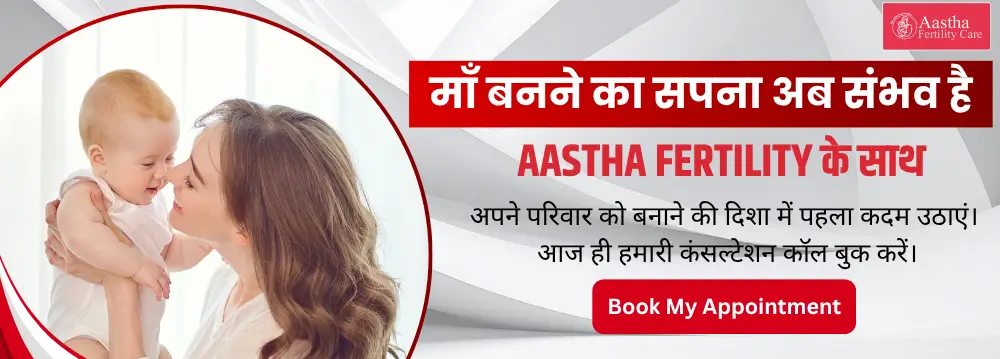
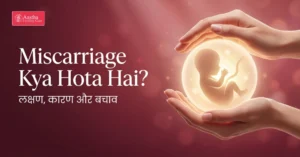
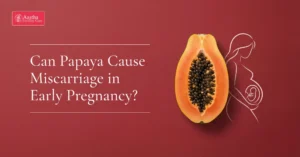

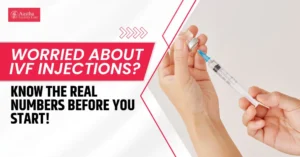
Leave a comment